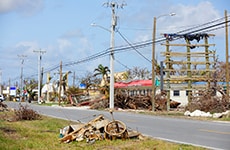Mississippi

- State Population: 2,940,057
- Local Health Departments: 86
- Frequent Public Health Emergencies: Tornadoes, Flooding, Tropical Storms/Hurricanes
- Key Emergency Operations Center Activations:
2020 – COVID-19 Pandemic - CDC PHEP Funding:
FY 2022: $6,601,489
FY 2021: $6,655,374
FY 2020: $6,936,267 - Public Health Crisis Response Funding:
Mpox 2023 Funding: $347,540
COVID-19 2021 Funding: $18,406,348
COVID-19 2020 Funding: $5,874,996
- Epidemiologists: 2
- Laboratorians: 7
- Nurses: 12
- Planners: 10
- Other: 25*
*Includes IT specialists, administrative staff, statisticians, and other positions
- Public Health Laboratory Testing
- Public Health Surveillance and Epidemiological Investigation
- Emergency Operations Coordination
- Medical Countermeasure Dispensing and Administration
- Community Preparedness

When severe adverse reactions to the use of synthetic cannabinoids increased dramatically in just two months, a PHEP-funded epidemiologist worked closely with an investigative team and healthcare providers to investigate. They developed an advanced surveillance system to track reports of these adverse reactions, which included symptoms such as lethargy, vomiting, and difficulty breathing. As a result, the Mississippi Poison Control Center and emergency departments across the state were able to identify associated deaths, finding the outbreak’s source and preventing additional adverse reactions.

In Mississippi, PHEP supports planning, training, and exercising for staff to effectively coordinate and manage an emergency response. When Hurricane Irma hit Florida as a Category 4 storm in 2017, Mississippi stood ready to help, and sent PHEP-funded and trained staff to Florida to support the response. After the storm destroyed the only hospital in the Middle Keys, staff members from Mississippi, along with staff from North Carolina, created a mobile hospital to serve the area’s residents. For more than nine months, this was the only hospital for 100 miles, serving the emergency medical needs of affected residents until the original structure was rebuilt.